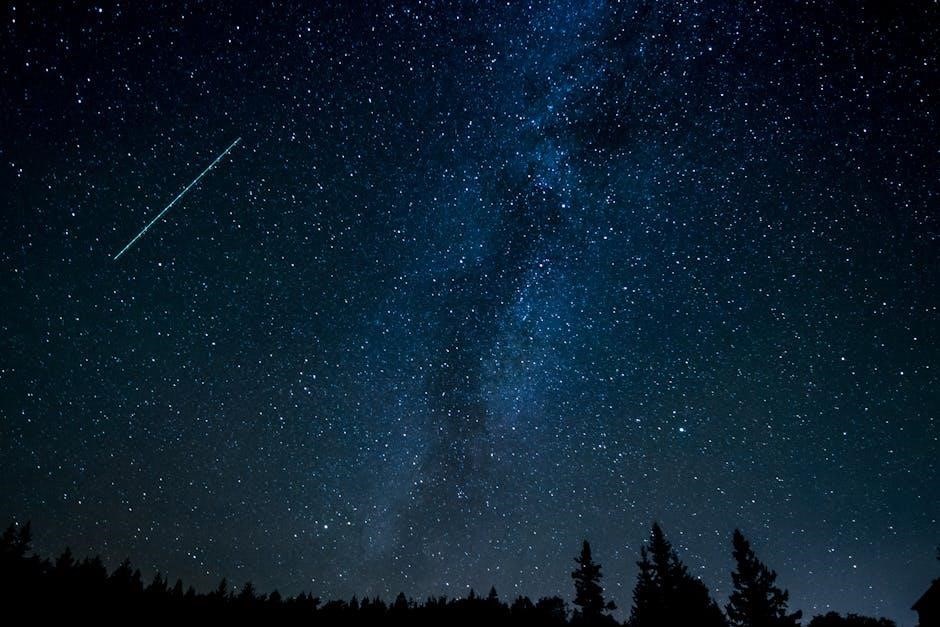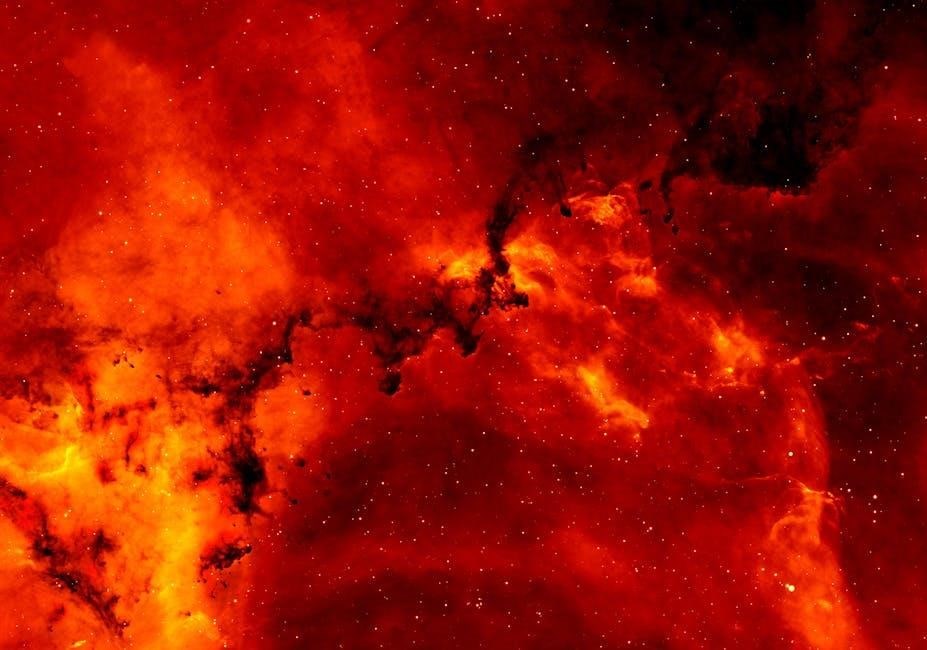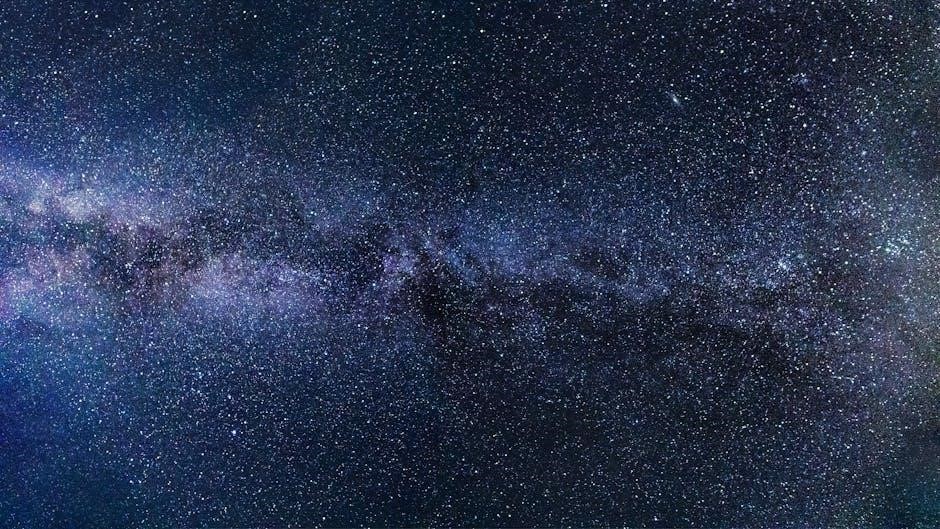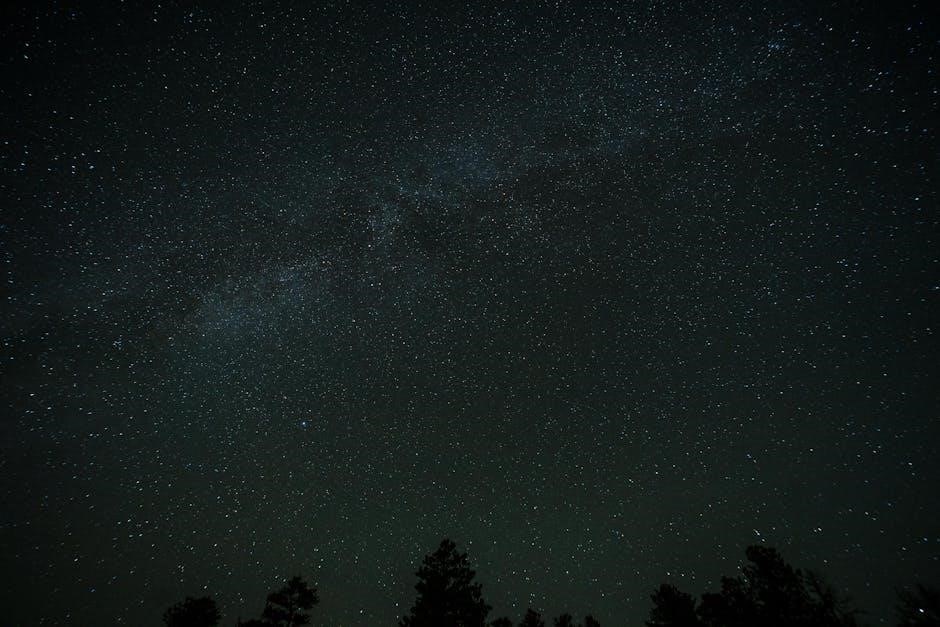
The Hitchhiker’s Guide to the Galaxy, created by Douglas Adams, is a comedic science fiction series that began as a 1978 BBC radio show. It follows Arthur Dent, rescued by Ford Prefect, as they explore the galaxy with a guidebook.
Blending humor and existential themes, the series satirizes life’s absurdity, becoming a cult classic and inspiring various adaptations, including novels, TV shows, and films, cementing its legacy as a timeless cosmic comedy.
Background and Creation

The Hitchhiker’s Guide to the Galaxy was conceived by Douglas Adams, an English author and humorist, and first aired as a BBC radio comedy series in 1978. The idea evolved from Adams’ fascination with science fiction and his desire to create a humorous, satirical take on the genre. Initially, the series was meant to be a radio show, but its popularity led to its expansion into novels, television adaptations, and even stage productions.
The story began with the demolition of Earth to make way for a hyperspace bypass, setting the stage for Arthur Dent’s intergalactic adventures. Adams drew inspiration from his own travels and observations of human behavior, blending absurdity with clever wit. The Guide itself, a fictional encyclopedia, became a central element, offering humorous and often irrelevant advice to travelers. Over time, the series grew into a “trilogy of five books,” selling millions of copies worldwide. Its 42nd anniversary in 2020 marked its enduring legacy, with plans for a new Hulu adaptation further cementing its place in pop culture.
Main Characters
Arthur Dent, an unwitting human survivor, joins Ford Prefect, an alien researcher, Zaphod Beeblebrox, the two-headed president, Trillian, a human woman in space, Marvin, a depressed android, and Slartibartfast, a designer of planets, in their cosmic adventures.
Overview of Key Characters
The series revolves around Arthur Dent, an ordinary man who survives Earth’s demolition, and his misadventures with Ford Prefect, an alien researcher for the Hitchhiker’s Guide to the Galaxy. Zaphod Beeblebrox, the charismatic yet reckless two-headed president of the galaxy, often drives the plot forward with his impulsive decisions. Trillian, a human woman who also escapes Earth, brings intelligence and adaptability to the group. Marvin, the paranoid android, provides dark humor with his pessimistic outlook on life. Other notable characters include Slartibartfast, a designer of planets, and Vogons, the brutish, poetry-loving aliens responsible for Earth’s destruction. Each character embodies unique traits that contribute to the series’ satirical exploration of life, the universe, and everything in between.

Major Themes
The Hitchhiker’s Guide to the Galaxy explores existentialism, absurdity, and the search for meaning in a chaotic universe. It satirizes human existence, technology, and bureaucracy, blending humor with profound philosophical questions about life, the universe, and everything.
Existentialism and Satire
The Hitchhiker’s Guide to the Galaxy masterfully blends existentialism and satire, exploring the absurdity of life in a vast, indifferent universe. Through Arthur Dent’s journey, Douglas Adams critiques human-centric views, highlighting the cosmic insignificance of Earth and humanity.
The series satirizes societal norms, technology, and bureaucracy, often using humor to mask deeper philosophical questions. The search for the “ultimate answer to life, the universe, and everything” (42) underscores the futility of seeking simple solutions to complex existential dilemmas.

Adams’ wit and irony expose the absurdity of human endeavors, such as the destruction of Earth for a hyperspace bypass, while characters like Marvin the Paranoid Android embody existential despair. The book’s satire challenges readers to reflect on their place in the universe, blending comedy with profound insights.
By juxtaposing cosmic scale with human-scale concerns, Adams creates a narrative that is both entertaining and thought-provoking, inviting readers to laugh at the absurdity of existence while contemplating its meaning.
The Books in the Series
The Hitchhiker’s Guide to the Galaxy series includes five novels: The Hitchhiker’s Guide to the Galaxy, The Restaurant at the End of the Universe, Life, the Universe and Everything, So Long, and Thanks for All the Fish, and Mostly Harmless. The omnibus edition also features the bonus story Young Zaphod Plays It Safe, celebrating the series’ 42nd anniversary as a Hulu original series.

List and Brief Description
The Ultimate Hitchhiker’s Guide to the Galaxy is a collection of five novels and one short story by Douglas Adams. The series includes:
- The Hitchhiker’s Guide to the Galaxy: Introduces Arthur Dent, a man rescued by his alien friend Ford Prefect, as Earth is destroyed to make way for a hyperspace bypass.
- The Restaurant at the End of the Universe: Arthur and Ford travel to the end of time, encountering bizarre creatures and uncovering the purpose of Earth’s creation.
- Life, the Universe and Everything: The group faces the threat of the Krikkiters, who seek to destroy the universe, while exploring themes of existence and meaning.
- So Long, and Thanks for All the Fish: Arthur returns to Earth, only to find it restored, and discovers a mysterious connection to a dolphin and a girl named Fenchurch.
- Mostly Harmless: The final novel sees Arthur confronting the destruction of Earth again, while Ford and Trillian deal with the guide’s AI takeover.
- Young Zaphod Plays It Safe: A bonus short story exploring the early adventures of Zaphod Beeblebrox, the two-headed president of the galaxy.
This omnibus edition celebrates the series’ 42nd anniversary and its upcoming adaptation as a Hulu original series, offering a complete journey through space, time, and comedy.
Adaptations
The Hitchhiker’s Guide to the Galaxy has been adapted into various formats, including a 1978 BBC radio series, a 1981 television series, a 2005 feature film, and stage productions. A text adventure game and an upcoming Hulu series further expand its reach.
Radio, TV, Film
The Hitchhiker’s Guide to the Galaxy began as a 1978 BBC radio comedy series, laying the foundation for its cult status. The radio show’s success led to a 1981 television adaptation, featuring vibrant visuals and loyal fans. In 2005, a feature film was released, starring Martin Freeman as Arthur Dent and Zooey Deschanel as Trillian, blending humor and stunning effects. An upcoming Hulu original series promises to reintroduce the story to new audiences, ensuring its legacy endures. Each adaptation has captured the essence of Douglas Adams’ wit and cosmic satire, resonating with fans across generations. The franchise’s ability to evolve while staying true to its core themes has solidified its place in science fiction history. These adaptations have not only expanded the story’s reach but also showcased its timeless appeal, making it a beloved classic in multiple formats. The journey from radio to screen highlights the versatility of Adams’ creation, proving that humor and science fiction can coexist brilliantly.
Cultural Legacy
The Hitchhiker’s Guide to the Galaxy has left an indelible mark on popular culture, inspiring countless fans and influencing science fiction and comedy. Its cult following endures, with the series being nominated as one of America’s best-loved novels, ensuring its timeless appeal and legacy.
Impact and Influence
The Hitchhiker’s Guide to the Galaxy has profoundly influenced science fiction and comedy, inspiring countless adaptations and works. Its unique blend of humor and existential themes has shaped the genre, making it a cultural phenomenon. The series’ iconic concepts, like the number 42, have become ingrained in popular culture, symbolizing the search for life’s meaning. Its influence extends beyond literature, impacting film, television, and even technology, with figures like Elon Musk citing it as an inspiration. The franchise’s ability to transcend mediums has solidified its legacy, ensuring its relevance across generations. By blending satire with cosmic adventure, Douglas Adams created a timeless classic that continues to resonate with audiences worldwide, leaving an indelible mark on both entertainment and intellectual discourse.

Notable Concepts
42, the “Answer to the Ultimate Question of Life, the Universe, and Everything,” is a central motif. The Hitchhiker’s Guide to the Galaxy, a fictional guidebook, and the importance of carrying a towel are iconic elements that define the series’ unique humor and philosophy.
42, The Guide, Towel
The number 42 is a central concept, representing the “Answer to the Ultimate Question of Life, the Universe, and Everything.” This enigmatic number, derived from a supercomputer’s calculation, symbolizes the search for meaning in an indifferent cosmos.

The Hitchhiker’s Guide to the Galaxy itself is a fictional reference guide that plays a pivotal role in the series. It serves as both a practical tool for intergalactic travelers and a metaphor for humanity’s quest for knowledge and understanding.
The towel is another iconic element, emphasized as the most essential item for any space traveler. It symbolizes preparedness, practicality, and the absurdity of relying on simple solutions in the face of cosmic unpredictability.
Together, these concepts—42, The Guide, and the towel—capture the blend of humor, philosophy, and satire that defines Douglas Adams’ work. They resonate with readers, embodying the series’ themes of existential inquiry and the human condition.

Reception and Reviews
The Hitchhiker’s Guide to the Galaxy has received widespread critical acclaim for its witty humor and satirical depth. It was nominated as one of America’s best-loved novels by PBS’s The Great American Read and praised by critics for its originality and insight.
Critical and Public Response

The Hitchhiker’s Guide to the Galaxy has garnered widespread acclaim for its unique blend of humor, satire, and philosophical insights. Critics praise Douglas Adams’ witty prose and imaginative storytelling, with many hailing it as a landmark in science fiction comedy. The series has been nominated as one of America’s best-loved novels by PBS’s The Great American Read, further cementing its cultural significance.
The public response has been equally enthusiastic, with fans appreciating its irreverent take on existential themes and cosmic absurdity. The book’s ability to balance humor with profound questions about life and the universe has resonated with readers worldwide. Its influence extends beyond literature, inspiring adaptations and becoming a cultural touchstone. The series’ enduring popularity is a testament to its timeless appeal and universal themes.
The Hitchhiker’s Guide to the Galaxy remains a timeless blend of humor, satire, and existential philosophy, leaving a lasting impact on science fiction and popular culture. Its 42nd anniversary celebrates its enduring legacy as a cosmic comedy classic.
With its unique voice and universal themes, Douglas Adams’ creation continues to resonate, inspiring new adaptations and delighting fans across generations, solidifying its place as a beloved and influential work of fiction.
Final Thoughts

The Hitchhiker’s Guide to the Galaxy is a masterpiece of comedic science fiction that has left an indelible mark on popular culture. Its unique blend of humor, satire, and existential philosophy continues to resonate with audiences, making it a timeless classic.
Douglas Adams’ creation not only redefined the science fiction genre but also inspired countless adaptations, from radio and television to films and stage productions. The series’ ability to balance absurdity with profound insights into life, the universe, and everything has made it a favorite among readers and viewers alike.
As the series celebrates its 42nd anniversary, its relevance remains undiminished. The upcoming Hulu adaptation promises to introduce this cosmic comedy to a new generation, ensuring that Arthur Dent, Ford Prefect, and their misadventures will continue to delight audiences for years to come.
The Ultimate Hitchhiker’s Guide to the Galaxy is more than just a story; it’s a cultural phenomenon that reminds us to “Don’t Panic!” and find humor in the chaos of existence. Its legacy is a testament to the power of creativity and the enduring appeal of a well-told tale.